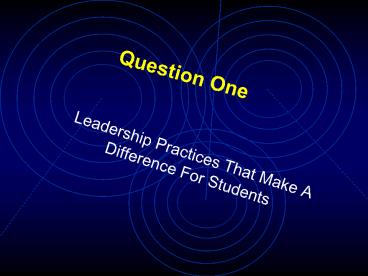Question One - PowerPoint PPT Presentation
1 / 17
Title:
Question One
Description:
problem-based instruction. significant internships. alternative dissertation designs ... School conditions. Class conditions. Individual teachers. Professional ... – PowerPoint PPT presentation
Number of Views:19
Avg rating:3.0/5.0
Title: Question One
1
Question One
- Leadership Practices That Make A Difference For
Students
2
Past Decade Context-independent Leadership
Practices
- Hallinger Heck (1996)
- Leithwood Riehl (2005)
- Waters, Marzano McNulty (2005)
- Robinson et al (2007)
3
One example
- Setting Directions
- Developing People
- Redesigning the Organization
- Managing the Instructional Program
4
GroupGoals
Vision
SettingDirections
Communication
Expectations
5
Next Steps Levels Of LeadershipEnactment
- Level 2 Broad contextual differences
- Level 3 Mid-range contextual
differences - Level 4 Dyadic differences
6
Level 2 Broad Contextual Differences
- e.g.
- School size and school level
- Student population characteristics
- Unique policy demands
- Level of school performance
7
Level 3 Mid-range Contextual Differences
- Middletown elementary school
- vs.
- Pearson Elementary school
- Unique values of all broad contextual differences
interacting together
8
Level 4 Dyadic Contextual Differences
- Moiras parents vs. Sheldons parents
- The experienced, highly committeed grade 7
science teacher vs. the new, undecided grade 4
teacher. - LMX Theory
9
Sohow relevant is current research?
- Tells us what all successful leaders do
- But limited by the very large grain size of the
knowledge - Not yet able to discriminate, for example
- large vs. small school
- high performing vs. turnaround schools
10
Question Two
- Guidance About How To Prepare Leaders To Be More
Effective
11
Three Sets Of Challenges
- Content ..of leadership preparation experiences
- Nature ..of the preparation experiences
- Evaluation ..of effects
12
CONTENT
- Leadership standards should reflect context-free
successful practices and when possible, their
enactments at level 2 - Preparation of leaders for successful practice
at levels 3 and 4 should focus on the development
of their problem solving expertise
13
PROCESS constructed, social,
situated aggressive recruitmentcohort
groupsproblem-based instructionsignificant
internshipsalternative dissertation
designscollaboration with schools districts
14
Still need more clarity about purposes for
alternative processes
- Didactic methods help develop declarative
knowledge - Case study methods good for transforming
declarative into procedural knowledge - internships and district collaboration-
opportunities for level 3 and 4 enactments
15
Evaluating Program Effects
- Moderating
- Family background
- Family ed. culture
- Gender
- Independent
- Leader practices
Dependent (student outcomes)
- Mediating
- School conditions
- Class conditions
- Individual teachers
- Professional community
16
Leadership Program Effects
- Antecedents
- Programs
- (but also)
- Socialization
- Traits, values
- Early childhood experiences
Leadership Practices
17
Bringing the ideal and the doable closer together
- Very few program assessments get to student
outcomes - Student outcomes may be too ambitious a reach
(technically and fiscally) - More attention in programs to variables with
demonstrable effects on students - More attention in program evaluations to impact
on those variables































